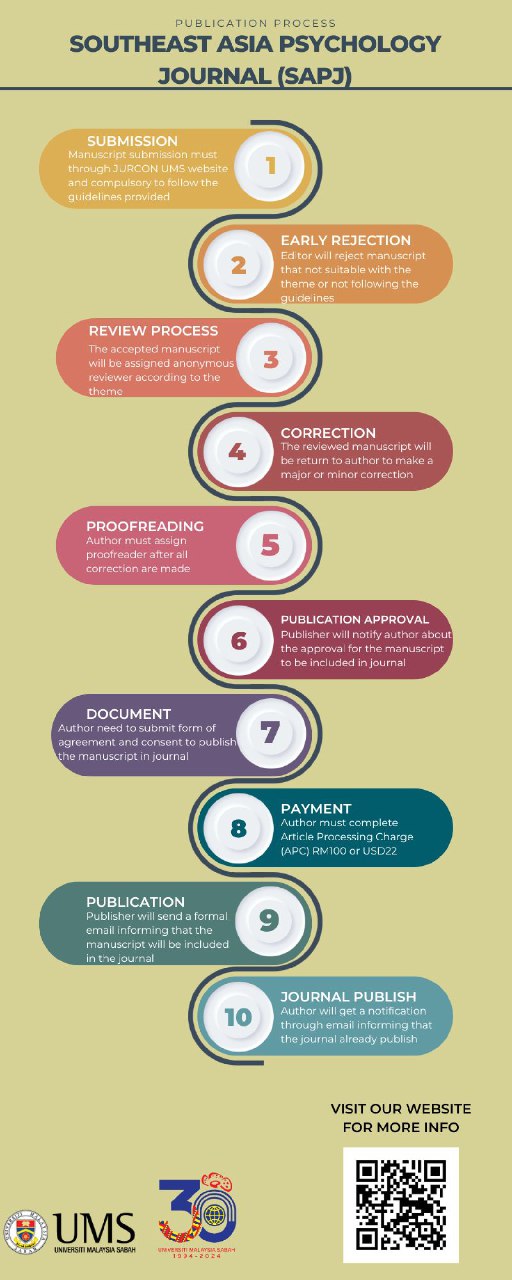THE EFFECTS OF MASTERY LEVEL, FREQUENCY OF SMARTPHONE USAGE, AND SLEEP DISTURBANCES ON LIFE SATISFACTION OF MALAYSIAN UNIVERSITY STUDENTS
DOI:
https://doi.org/10.51200/sapj.v10i2.4936Keywords:
Smartphone Usage, Mastery, Sleep Disturbances, Life Satisfaction, University StudentsAbstract
This study aims to determine whether mastery level, frequency of smartphone usage, and sleep disturbances could influence Malaysian university students’ life satisfaction. Specifically, it examines which variable has the most contribution to life satisfaction. To test the hypotheses that all predictor variables have a significant impact on life satisfaction, an online survey was distributed randomly to university students across Malaysia (N = 228). Measurement tools included the Satisfaction with Life Scale (SWLS), the Pittsburgh Sleep Quality Index (PSQI), Pearlin Mastery Scale (PMS). The answers were analysed using multiple regression analysis. The results showed small effects of mastery level and frequency of smartphone usage on life satisfaction however, sleep disturbances did not support the hypothesis. The multiple regression analysis demonstrated that mastery level has the most contribution to life satisfaction. Furthermore, this study discovered a piece of valuable information on factors that resulted in disturbed sleep which can be utilised for future research. Lastly, limitations and implications from this study and future research recommendations were also included in this paper.
References
Amit, K., Karen, Z., K. (2020). The potential impact of the Covid-19 pandemic on occupational status, work from home, and occupational mobility. Journal of Vocational Behavior, 119. Antaramian, S. (2017). The importance of very high life satisfaction for students’ academic success. Cogent Education, 4(1). https://doi.org/10.1080/2331186X.2017.1307622 Arslan, S., & Akkas, O. A. (2014). Quality of College Life (QCL) of students in Turkey: Students’ life satisfaction and identification. Social Indicators Research, 115(2), 869–884. https://doi.org/10.1007/s11205-013-0235-9 Bailey, T., Eng, W., Frisch, M., & Snyder, C. R. (2007), Hope and optimism as related to life satisfaction. Journal of Positive Psychology, 2(3), 168–169. Baumeister, R. & Leary, M. R. (1995). "The need to belong: Desire for interpersonal attachments as a fundamental human motivation". Psychological Bulletin, 117 (3), 497–529. Bhamu, P., Yadav, J. S., & Madnawat, A. V. S. (2018). Locus of Control and Life Satisfaction among college students. Recent Advances in Psychology, 3(1), 22-28. Campbell, R., Vansteenkiste, M., Delesie, L. M., Mariman, A. N., Soenens, B., Tobback, E., Van der Kaap-Deeder, J., & Vogelaers, D. P. (2015). Examining the role of psychological need satisfaction in sleep: A Self-Determination Theory perspective. Personality and Individual Differences, 77(January 2018), 199–204. https://doi.org/10.1016/j.paid.2015.01.003 Chen, Y., Hsiung, P., Chung, L., Chen, S., & Pan, A. (2013). Psychometric properties of the Mastery Scale-Chinese version. Applying classical test theory and Rasch analysis. Scandinavian Journal of Occupational Therapy, 20: 404-411 Daniello, A., Fievisohn, E., & Gregory, T. S. (2012). Modeling the effects of caffeine on the sleep/ wake cycle. Biomedical sciences instrumentation, 48, 73–80. Deci, E. L. (1975). Intrinsic motivation. New York: Plenum. Deci, E. L., & Ryan, R. M. (1985). The general causality orientations scale: Self-determination in personality. Journal of research in personality, 19(2), 109-134. Diener, E. (1984). Subjective well-being. Psychological Bulletin. 95 (3), 542–575. doi:10.1037/0033-2909.95.3.542 Diener, E., Emmons, R. A., Larsen, R. J., & Griffin, S. (1985). The Satisfaction with Life Scale. Journal of Personality Assessment, 49, 71-75. Duong, C. D. (2021). The impact of fear and anxiety of Covid-19 on life satisfaction: Psychological distress and sleep disturbance as mediators. Personality and Individual Differences, 178, 110869. https://doi.org/10.1016/j.paid.2021.110869 Elias, H., Ping, W. S., & Abdullah, M. C. (2011). Stress and academic achievement among undergraduate students in Universiti Putra Malaysia. Procedia - Social and Behavioral Sciences, 29, 646–655. https://doi.org/10.1016/j.sbspro.2011.11.288 Engel, G. L. (1997). From biomedical to biopsychosocial: Being scientific in the human domain. Psychosomatics, 38(6), 521-528. Espie, C. A. (2006). Overcoming Insomnia: A Self-Help Guide Using Cognitive Behavioural Therapy. eprints.gla.ac.uk/33995/ Fernández-De-Las-Peñas, C., Fernández-Muñoz, J. J., Palacios-Ceña, M., Parás-Bravo, P., Cigarán-Méndez, M., & Navarro-Pardo, E. (2018). Sleep disturbances in tension-type headache and migraine. Therapeutic Advances in Neurological Disorders, 11, 1–6. https://doi.org/10.1177/1756285617745444
Ford, D. E, & Kamerow, D. B. (1989). Epidemiologic study of sleep disturbances and psychiatric disorders. An opportunity for prevention? Journal of American Medical Association, 262, 1479–84. Harvey, A. G. (2001). I Can’t Sleep, My Mind Is Racing! An Investigation of Strategies of Thought Control in Insomnia. Behavioral and Cognitive Psychotherapy, 29(1), 3–11. Hirshkowitz, M., Whiton, K., Albert, S. M., Alessi, C., Bruni, O., DonCarlos, L., Hazen, N., Herman, J., Katz, E. S., Kheirandish-Gozal, L., Neubauer, D. N., O'Donnell, A. E., Ohayon, M., Peever, J., Rawding, R., Sachdeva, R. C., Setters, B., Vitiello, M. V., Ware, J. C., & Adams Hillard, P. J. (2015). National Sleep Foundation's sleep time duration recommendations: methodology and results summary. Sleep health, 1(1), 40–43. https://doi.org/10.1016/j.sleh.2014.12.010 Howell, J. L., & Sweeny, K. (2019). Fulfilling psychological needs predicts less sleep disruption and worry while awaiting uncertain news. Stress and Health, 35(3), 277–288. https://doi.org/10.1002/smi.2860 Kang, J. H. & Chen, S. C. (2009). Effects of an irregular bedtime schedule on sleep quality, daytime sleepiness, and fatigue among university students in Taiwan. BMC Public Health, 9, 248. doi: 10.1186/1471-2458-9-248 Kaya, F., Bostanci Daştan, N., & Durar, E. (2020). Smart phone usage, sleep quality and depression in university students. International Journal of Social Psychiatry. https://doi.org/10.1177/0020764020960207 Kim, C., & Ko, H. (2018). The impact of self-compassion on mental health, sleep, quality of life and life satisfaction among older adults. Geriatric Nursing, 39(6), 623–628. https://doi.org/10.1016/j.gerinurse.2018.06.005 Kula, H., Ayhan, C., & Soyer, F. (2020). The Relationship Between Smartphone Addiction and Life Satisfaction: Faculty of Sport Sciences Students. International Journal of Psychology and Educational Studies, 7(1), 86–95. https://doi.org/10.17220/ijpes.2020.01.008 Lacruz, M. E., Schmidt-Pokrzywniak, A., Dragano, N., Moebus, S., Deutrich, S. E., Möhlenkamp, S., Schmermund, A., Kaelsch, H., Erbel, R., & Stang, A. (2016). Depressive symptoms, life satisfaction and prevalence of sleep disturbances in the general population of Germany: Results from the Heinz Nixdorf Recall study. BMJ Open, 6(1), 1–8. https://doi.org/10.1136/bmjopen-2015-007919 Lepp, A., Barkley, J. E., & Karpinski, A. C. (2014). The relationship between cell phone use, academic performance, anxiety, and Satisfaction with Life in college students. Computers in Human Behavior, 31(1), 343–350. https://doi.org/10.1016/j.chb.2013.10.049 Leversen, I., Danielsen, A. G., Birkeland, M. S., & Samdal, O. (2012). Basic Psychological Need Satisfaction in Leisure Activities and Adolescents’ Life Satisfaction. Journal of Youth and Adolescence, 41(12), 1588–1599. https://doi.org/10.1007/s10964-012-9776-5 Li, J., Lepp, A., & Barkley, J. E. (2015). Locus of control and cell phone use: Implications for sleep quality, academic performance, and subjective well-being. Computers in Human Behavior, 52, 450–457. https://doi.org/10.1016/j.chb.2015.06.021 Malinauskas, R., Dumciene, A., & Lapeniene, D. (2014). Social skills and life satisfaction of lithuanian first- and senior-year university students. Social Behavior and Personality, 42(2), 285–293. https://doi.org/10.2224/sbp.2014.42.2.285 Medic, G., Wille, M., & Hemels, M. E. H. (2017). Short- and long-term health consequences of sleep disruption. Nature and Science of Sleep, 9, 151–161. https://doi.org/10.2147/NSS.S134864 National Health Service. (2021). Coronavirus (COVID-19) vaccines side effects and safety. COVID-19 vaccination. https://www.nhs.uk/conditions/coronavirus-covid-19/coronavirus-vaccination/safety-and-side-effects/ Ness, T. E. B., & Saksvik-Lehouillier, I. (2018). The Relationships between Life Satisfaction and Sleep Quality, Sleep Duration and Variability of Sleep in University Students. Journal of European Psychology Students, 9(1), 28–39. http://doi.org/10.5334/jeps.434 Orkibi, H., & Ronen, T. (2017). Basic psychological needs satisfaction mediates the association between self-control skills and subjective well-being. Frontiers in Psychology, 8, 1–10. https://doi.org/10.3389/fpsyg.2017.00936 Park, N., Kim, Y. C., Shon, H. Y., & Shim, H. (2013). Factors influencing smartphone use and dependency in South Korea. Computers in Human Behavior, 29, 1763-1770. Pearlin, L. I., & Schooler, C. (1978). The structure of coping. Journal of Health and Social Behavior, 19(1), 2–21.
Plouffe, R. A., & Tremblay, P. F. (2017). The relationship between income and life satisfaction: Does religiosity play a role? Personality and Individual Differences, 109, 67–71. https://doi.org/10.1016/j.paid.2016.12.044 Ponto M. T. (1999). Relationship between students' locus of control and satisfaction. British Journal of Nursing, 8(3), 176–181. https://doi.org/10.12968/bjon.1999.8.3.6705 Riley, T. L. (1985). Biological organization of sleep. Clinical Aspects of Sleep and Sleep Disturbance, 11-37. Butterworth Publishers Boston. Sam, D. L. (1998). Predicting life satisfaction among adolescents from immigrant families in Norway. Ethnicity and Health, 3(1–2), 5–18. https://doi.org/10.1080/13557858.1998.9961844 Siahpush, M., Spittal, M., & Singh, G. K. (2008). Happiness and life satisfaction prospectively predict self-rated health, physical health, and the presence of limiting, long-term health conditions. American Journal of Health Promotion, 23(1), 18–26. https://doi.org/10.4278/ajhp.061023137 Sirgy, M. J., Lee, D. J., Grzeskowiak, S., Yu, G. B., Webb, D., El-Hasan, K., Garcia Vega, J. J., Ekici, A., Johar, J. S., Krishen, A., Kangal, A., Swoboda, B., Claiborne, C. B., Maggino, F., Rahtz, D., Canton, A., & Kuruuzum, A. (2010). Quality of College Life (QCL) of Students: Further Validation of a Measure of Well-being. Social Indicators Research, 99(3), 375–390. https://doi.org/10.1007/s11205-010-9587-6 Shin, J. E., & Kim, J. K. (2018). How a good sleep predicts life satisfaction: The role of zero-sum beliefs about happiness. Frontiers in Psychology, 9(AUG), 1–4. https://doi.org/10.3389/fpsyg.2018.01589 Smit, A. N., Juda, M., Livingstone, A., U, S. R., & Mistlberger, R. E. (2021). Impact of COVID-19 social-distancing on sleep timing and duration during a university semester. PloS one, 16(4), e0250793. https://doi.org/10.1371/journal.pone.0250793 Suleiman, K., Yates, B., Jassem, H., Alghabeesh, S., Abu-Shahroor, L., & Ali, R. (2013). Sleep Disturbances among Alzaytoonah University Students in Jordan. Journal of Natural Sciences Research Www.Iiste.Org ISSN, 3(12). www.iiste.org Sundjoto. (2017). The Role of Internal Locus of Control on Intrinsic Motivation and Employee Performance of Ceramic Company in East Java. IOSR Journal of Business and Management Ver. VII, 19(7), 2319–7668. https://doi.org/10.9790/487X-1907072935 Taukeni, S. (2014). The Main Challenges Student Mothers Experience to Manage Their Dual Roles. International Journal of Advances in Psychology, 3(3), 94. https://doi.org/10.14355/ijap.2014.0303.04 Taş, İ., & İskender, M. (2017). An Examination of Meaning in Life, Satisfaction with Life, Self-Concept and Locus of Control among Teachers. Journal of Education and Training Studies, 6(1), 21. https://doi.org/10.11114/jets.v6i1.2773 Tejedor, S., Cervi, L., Pérez-Escoda, A., & Tusa, F. (2020). Smartphone usage among students during COVID-19 pandemic in Spain, Italy and Ecuador. ACM International Conference Proceeding Series, 571–576. https://doi.org/10.1145/3434780.3436587 Turner, A. D., Smith, C. E., & Ong, J. C. (2017). Is purpose in life associated with less sleep disturbance in older adults? Sleep Science and Practice, 1(1), 1–10. https://doi.org/10.1186/s41606-017-0015-6 University of British Columbia. (2021). High life satisfaction linked to better overall health. ScienceDaily. Retrieved from www.sciencedaily.com/releases/2021/03/210303091405.htm Vansteenkiste, M., Ryan, R. M., & Soenens, B. (2020). Basic psychological need theory: Advancements, critical themes, and future directions. In Motivation and Emotion (Vol. 44, Issue 1). Springer US. https://doi.org/10.1007/s11031-019-09818-1 Veenhoven, R. (1996). The study of life satisfaction. In W. E. Saris, R. Veenhoven, A. C. Scherpenzeel, & B. Bunting (Eds.), A comparative study of satisfaction with life in Europe (pp. 11-48). Budapest: EOtvOs University Press.White, R. W. (1959). Motivation reconsidered: The concept of competence. Psychological Review, 66(5), 297–333.
Yetim, U. (2003). The impacts of individualism/collectivism, self-esteem, and feeling of mastery on life satisfaction among the Turkish University students and academicians. Social Indicators Research, 61(3), 297–317. https://doi.org/10.1023/A:1021911504113








